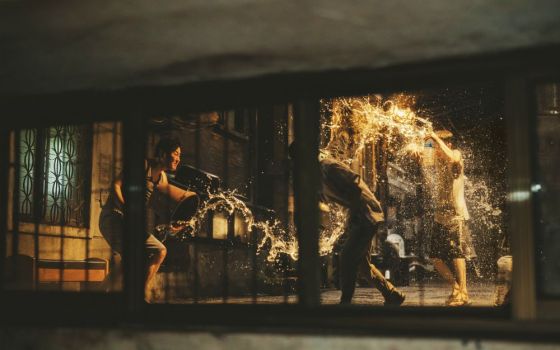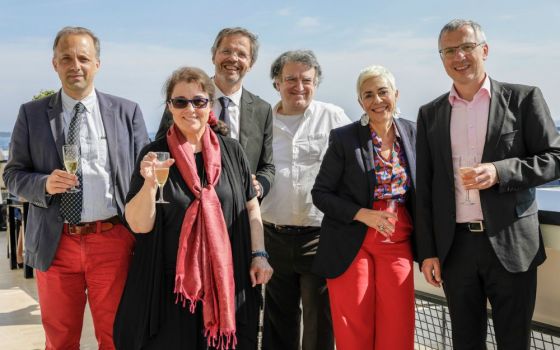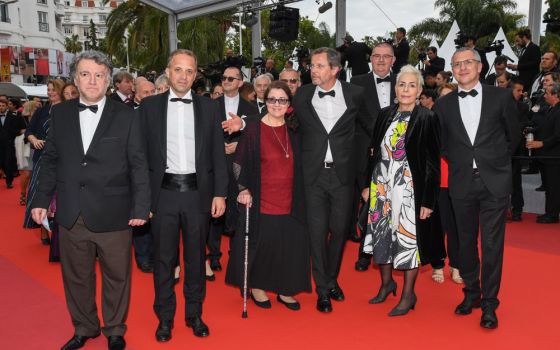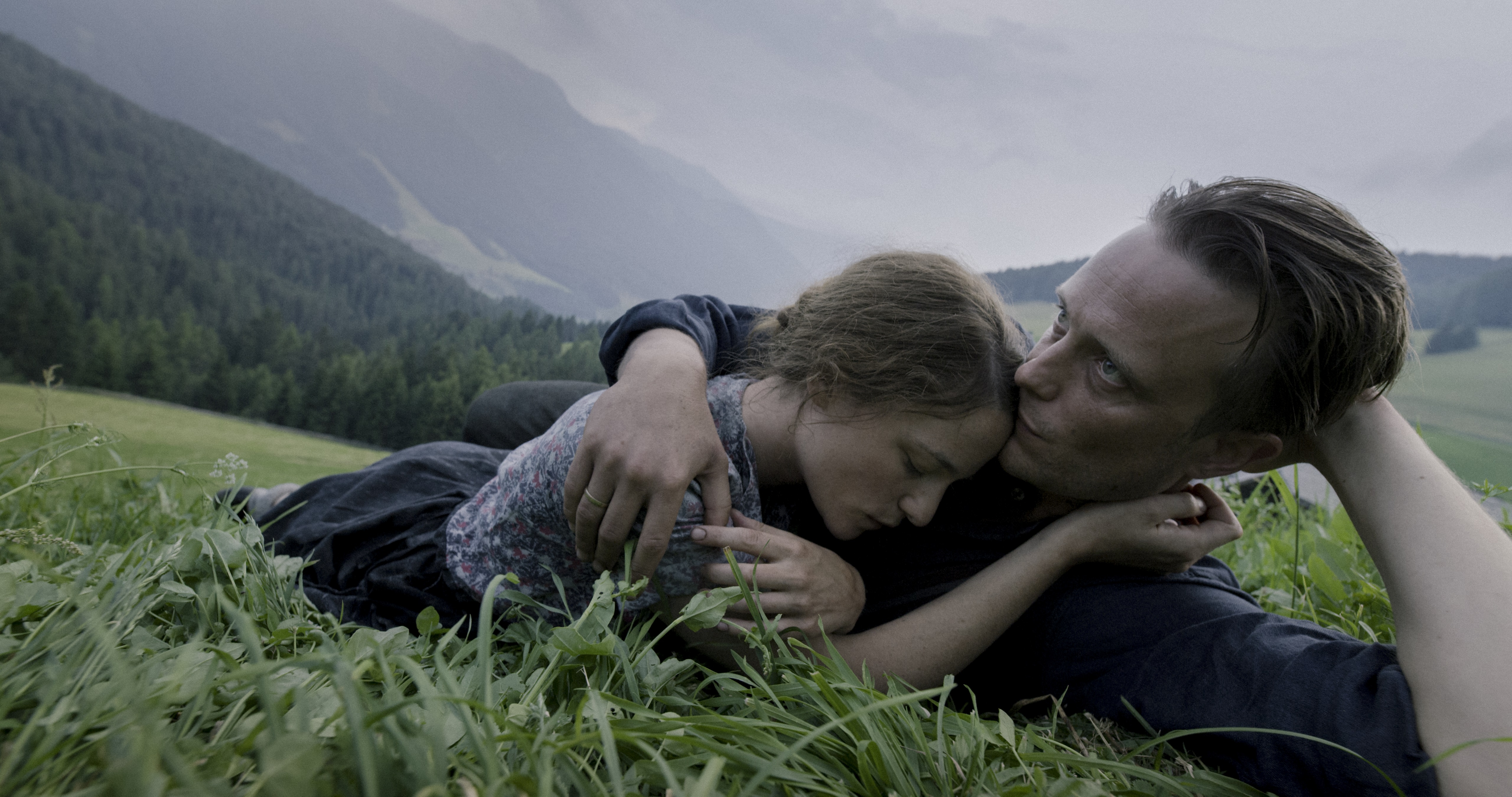
August Diehl as Franz Jägerstätter and Valerie Pachner as his wife, Franziska, in Terrence Malick's new film "A Hidden Life." (Courtesy of Festival de Cannes)
Cannes, France, located on the French Riviera and not too far from the Italian border, has been the home of the Cannes International Film Festival since its beginning in 1946. Unlike the Venice International Film Festival that started in 1932 and was suspended during World War II, Cannes — like the Berlin International Film Festival that started in 1951 — is a post-war phenomenon celebrating the art of cinema. Together, these three film festivals make up what is called the "big three" of hundreds of festivals worldwide.
This year marks the sixth time I have participated on Catholic (at Venice) and ecumenical film juries. My first jury experience was in Venice in 2000, then 2010 and 2016. In 2003, I was part of the ecumenical jury at Berlin, followed by the ecumenical jury at Locarno (Switzerland) International Film Festival in 2005. What is so enriching about the festival jury experience is always the internationality of the jury makeup, the different perspectives and readings of the films and the process of awarding SIGNIS prizes from Catholic juries or the Ecumenical Prize presented by Interfilm and SIGNIS. I feel grateful and blessed to have had these experiences that broaden one's view of the world of cinema and help to discover and inform film criticism from human and Gospel perspectives.
In my next post, I will add more information about why I think it is important that churches participate in film festivals (and why we need to evolve into interfaith juries), but the first thing I want to share is a review of Terrence Malick's latest film, "A Hidden Life." It premiered May 19 and our ecumenical jury was featured on the red carpet. While it was very cool, and they announced our names, alas, no one asked for our autographs.
Ecumenical jurists pose at the Cannes Film Festival. From left to right are Konstantin Terzis (Greece), film critic of the daily AVGI of Athens; Xavier Accart (France), Journalist for the Christian weekly La Vie; NCR's Sr. Rose Pacatte; Roland Kauffmann, protestant minister and manager in charge of cultural and spiritual life in the Temple St Etienne in Mulhouse; Lucia Cuocci, producer/director for Protestantesimo and Sorgente di Vita on Raidue (Italy), Segni dei Tempi on LA1-RSI (Switzerland); Stefan Förner (Germany), press officer of the Archdiocese of Berlin. (Provided photo)
"A Hidden Life" is a contemplative kind of biopic of Austrian conscientious objector Franz Jägerstätter (1907-1943). He has now been beatified by the Catholic Church, but Malick's film is not about a man who becomes a statue on the altar; he avoids hagiography at every turn. Instead, the film's focus is on the inner journey of a man and wife, and ultimately the man himself, who makes an almost unthinkably difficult choice and finds true freedom by following his conscience.
The film picks up with Franz's (August Diehl) life in his home village of St. Radegund, Austria, not far from Salzburg in one direction and Braunau am Inn in the other. He and his wife Franziska (Valerie Pachner), work hard on the farm that Franz inherited from his father. They relish in their love for one another and their two young children, soon to be three. Their home is filled with Catholic images that reflect the inner reality of the faith and how they live their lives.
When Franz is called up for military training in 1941, he cannot bring himself to thrust a sword through a dummy soldier. He is exempted because he is a farmer. As the war progresses, he waits for a summons to report for duty and he and Fani talk about what he will do if the summons comes. Each day as the postman pedals by on his bike, they wait for the letter.
Franz is convinced that Adolf Hitler is an evil man, indeed "the anti-Christ," and he feels compelled in his heart not to swear allegiance to Hitler, a requirement for anyone serving in the German military. While Franz and his wife discuss other ways to serve and perhaps avoid taking the oath, Franz is determined to never take it.
Advertisement
Franz goes to Bishop Joseph Fliessen (Michael Nyqvist) to ask counsel. The bishop vacillates and tells Franz that the Bible says one is to love one's country. Franz and Fani, watching their beautiful daughters play in the fields, know that his decision will bring suffering. He is castigated by the mayor of the village, his "friend" who says that if he decides not to join the army, they will all suffer. Franz speaks of suffering two or three times to an elderly painter named Ohlendorf (Johan Leysen) who is restoring frescoes in the parish church. The painter says he has spent his life painting comfortable Christs; to paint a suffering Christ one must suffer. He muses that this day may still come to him.
Finally, the letter arrives in early 1943. Franz must report for service. He gets as far as taking the oath with all the other conscripts but he refuses to lift his hand in salute or say the words. He is arrested and imprisoned. At home, his wife and children are ostracized. His mother, Rosalia (Karin Neuhäuser) has never liked Fani and treats her coldly. She holds Franz' decision against her.
As the months drag on, Fani tries to see Franz and is unable to. They exchange letters, and this forms much of the voiceover narration as the film reaches its inevitable conclusion.
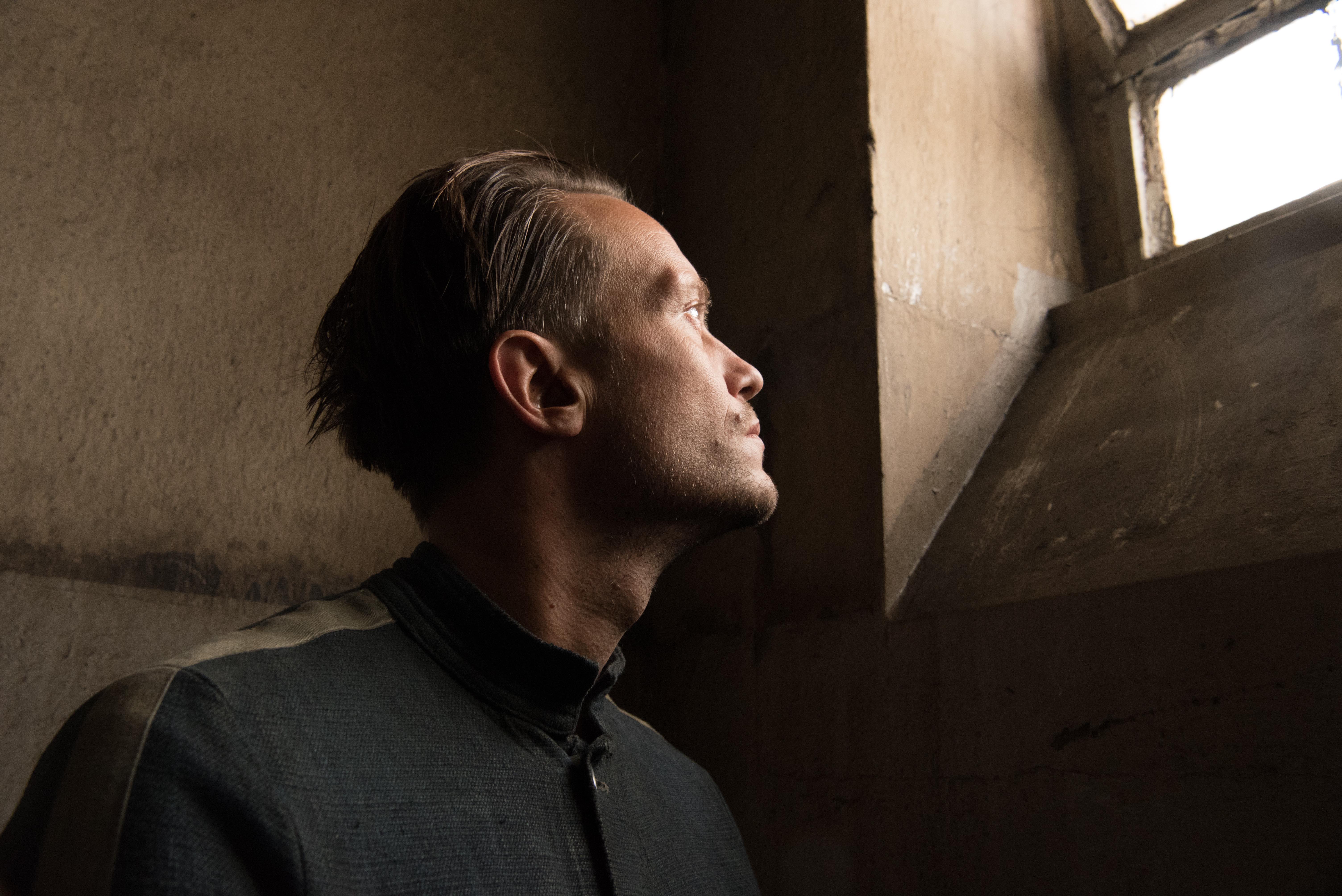
August Diehl stars as Franz Jägerstätter in "A Hidden Life." (Courtesy of Festival de Cannes)
"A Hidden Life" is certainly Malick's best film since his 2011 meditation on the meaning of life and suffering in "The Tree of Life." If you are familiar with Malick's work, you will soon realize he tells the same story over and over, but this time there is a difference: it is a biography told in his visually poetic style that celebrates what it means for a man to have and use one's conscience without ever using the word. At almost three hours long, this is the life of a man who was asked over and over by his bishop, fellow villagers and the military court: who would remember him for refusing to take the oath? What difference would one man's decision make in the outcome of the war? It made me think of the saying, if a tree falls in a forest and no one is there to hear it, does it make a sound?
Seventy-six years later, "the sound" of Jägerstätter's life and decision reverberates via Malick's film, which he also wrote. The music is by James Newton Howard, known for "The Dark Knight" and dozens of other scores. Works by Mozart, J.S. Bach, and Beethoven provide most of the soundtrack.
If you're not a person in a hurry, this is the 2019 film for you. Take your time and relish the artistry, the tension, the anxiety of choosing to follow one's conscience or choosing to go to a war one does not believe in and from which one may never return. Surrender to the discomfort of confronting what it means that "it is better to suffer injustice than to cause it," as one person tells Franz.
In another powerful scene, someone asks Franz in prison, "Why don't you just sign the paper and you can be free?" Franz responds, "But I am already free." I could not help but think of other stories and films that deal with themes similar to those in "A Hidden Life": St Thomas More, St. Joan of Arc and the film "Silence."
This is a film about discernment, conscience, character and integrity. It is about true freedom, heartbreak, humanity and family. The ethical and religious questions of the film ask us: Can one person truly make a difference in this world? Is it worth it to even try? Malick doesn't answer for you. He uses this film as bait; if you bite, it may hook you and make you squirm. The contrast and conflict of the film are between the comfort offered by its beauty and the discomfort of conscience offered by Christ's life, death, resurrection and teaching in the Gospels.
The film is not a complete biography of Franz Jägerstätter. You can find a documentary film, "Franz Jägerstätter: A Man of Conscience," directed by Jesuit Fr. Ron Schmidt and Jason Schmidt that is excellent. The book on which much of the film is based, Franz Jägerstätter: Letters and Writings from Prison is available from Orbis Books. Malick obtained the rights from Orbis for the film, and passages from these letters form much of the voiceover narration.
[Sr. Rose Pacatte, a member of the Daughters of St. Paul, is the founding director of the Pauline Center for Media Studies in Los Angeles.]





